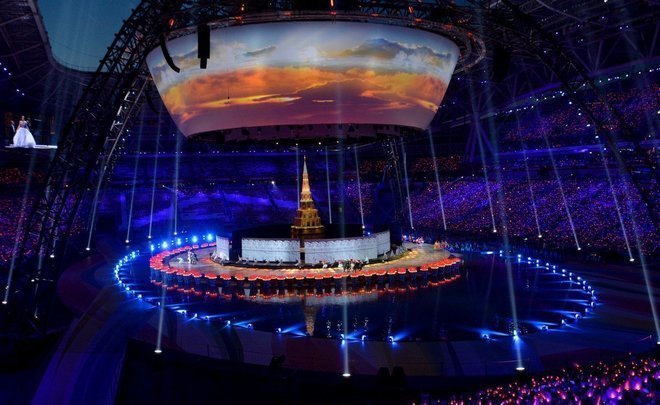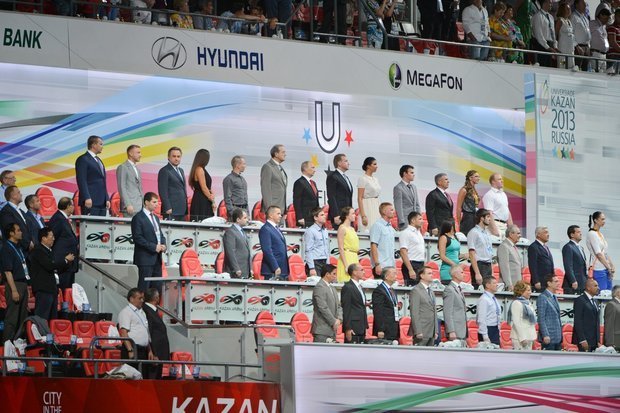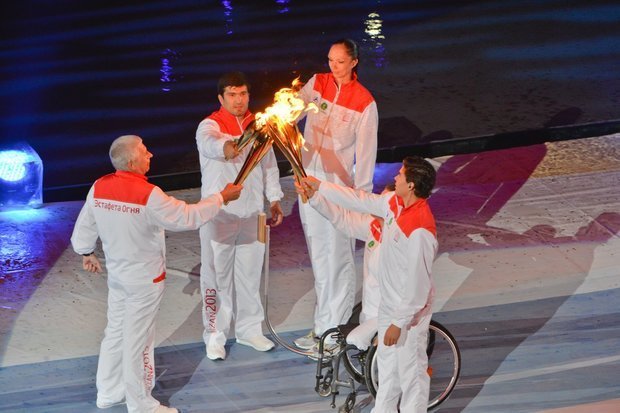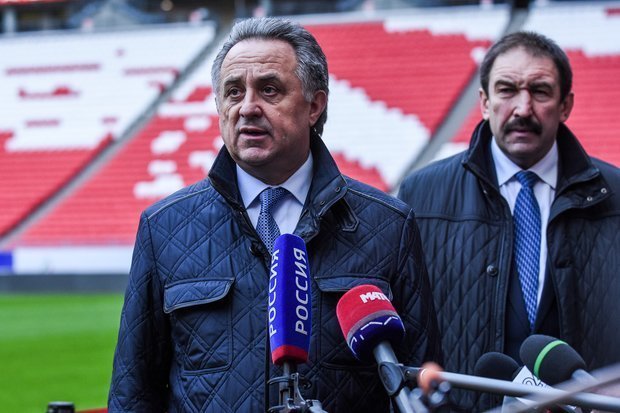10 years of Kazan Universiade
A holiday that is always with you

6 July marked exactly ten years since the beginning of the large-scale sports holiday in Russia — Summer Universiade in Kazan, which started on July 6, 2013. A year later, the Olympic Games started in Sochi, but the Winter Olympics, although more titular, were seriously inferior in scale to the University Games held in 27 sports. The sports editorial board of Realnoe Vremya recalls the landmark event 10 years ago and analyses the sports path of the most notable sports students of Kazan.
A time of massive superiority of Russia
If you look at 2013, it became one of the most successful for Russian sports. A month after the Universiade, the World Athletics Championship, which was extremely successful for Russia, was held in Moscow. Then the Sochi 2014 Olympics, followed by an avalanche of revelations of the “doping system”, the unimaginable onslaught of the West on Russian athletics, as a result of which eight medals of the 2013 World Cup were taken away from the national team (four gold, two silver and two bronze).
But even in the context of the Kazan Universiade at the time of 2013, it was more important that Polish Paweł Fajdek, Mexican Luis Rivera and Russians Alexander Menkov and Sergey Shubenkov quickly distinguished themselves in Moscow. It would seem that as soon as they climbed the podium in Kazan, they immediately proved themselves at the world championship. Fajdek and Menkov became world champions, Rivera and Shubenkov became bronze medalists. In general, hammer thrower Fajdek, having won in Kazan, then won five (!) gold medals at the world championships in a row — from 2013 to 2021.
Another Kazan student Lukáš Krpálek from the Czech Republic won the gold medal of the Universiade in judo. After that he became a two-time Olympic champion and a two-time world champion. The usual medals of the European Championships are a dime a dozen for these two giants of world sports, but both of them practically started their victorious path from Kazan. But Ukrainian boxer Oleksandr Gvozdyk finished his career as an amateur boxer in Kazan, where he arrived as a prize-winner of the 2012 Olympics in London. But, like Fajdek and Krpálek, he also began a new victorious path after Kazan, since Gvozdyk then became a professional boxer, a world champion according to one of the versions. American pole vaulter Sam Kendricks has won Olympic bronze and two gold medals at the World Championships since 2016. French foil fencer Enzo Lefort won gold and won Olympic silver in fencing, and he already has eight medals at the championships, including three gold ones.

Our response to Navalny*
But all of them, Gvozdyk, Krpálek, Lefort, Fajdek, Kendricks, like many other laureates of the Universiade 2013, heard derogatory statements from people who do not understand sports, replicated among fans and onlookers, thanks to the popularity of these characters. Alexey Navalny* said: “This whole topic with the Universiade is strange in general. Ahahaha. They surprise: a young 27-year-old student Yulia Zaripova took gold in the 3000 hurdles”). His political antipode, film director Tigran Keosayan, also spoke out: “The struggle of full-time students with part-time students," hinting at the gigantic advantage of Russian athletes over the guests of Kazan 2013. A decade later, life pushed these commentators into different political camps, but then they stood back to back.
Chinese Luo Yutong arrived in Kazan on the eve of his 28th birthday, the age limit for participation in the Universiades. He had an Olympic gold medal in London 2012 and two victories at the Diving World Championships. Another diving star, 26-year-old Paola Espinosa, represented Mexico, being a two-time Olympic medalist and world champion at the time of participation in the Kazan starts. The Kazan Universiade was her fourth in a row. A year older than Espinosa, Her teammate Rommel Pacheco, who won the Pan American Games back in 2003, at the time of the Universiade in Kazan, was 27 years old.
Two-time European swimming champion Polish Pavel Korzhenevsky turned 28 in Kazan, where he won gold in the 200-meter butterfly. If you “go through” the lists of champions, prize-winners, participants, there are dozens of such cases. The Russian national field hockey team was the eighth-ranked among all participating teams in its tournament, but under the leadership of Araik Margaryan beat Italy, Malaysia, South Africa, Poland, and in the decisive match France — 2:1, which had three players of the national team Baumgarten, Lockwood, Martin-Brisak. Russian water polo players, which included Syntez water polo players Albert Zinatullin, Artem Odintsov and Kazan water polo student Adel Latypov, who was playing for Volgograd at that time, beat the Serbian national team in the semifinals. In the Burevestnik pool, where this victory took place, a panel of multiple Olympic champion Svetlana Romashina hangs on the wall, but you can also hang photos of Serbian water polo players beaten by the Russians there.

Our response to Keosayan
Personally, I am not interested in the work of film director Tigran Keosayan at all, but I had to get acquainted, and in one of the films, Rabbit Over the Void, I even saw a reference to sports when the character of Vladimir Ilyin (by the way, who worked at the Kazan Youth Theatre), who saw the training of the Chisinau team, put it this way: “Moldovan hockey is a big top”. It would seem that stop there, insulted Moldovans, and that's enough, but Keosayan formulates his attitude to Kazan 2013 as “the struggle of full-time students with part-time students.” Who are the “part-time students”? Olympic champion Natalia Dovgodko (Ukraine, rowing). World champion Daniel Wistgott (Germany, rowing). Olympic badminton champions Tian Qing (China), Lee Yong-dae (South Korea), winners of two Olympic Games in Beijing 2008 and London 2012 Janet Bermoy and Idalys Ortiz from Cuba. These are judokas, one of whom won two Olympic silver medals, the second bronze and gold of the Olympics.
Olha Kharlan, a fencer from Ukraine, came to Kazan after two Olympic Games, bronze and gold. Her colleague from the French national team, Yannick Borel, came to Kazan already as a world champion, and after it, he won Olympic gold and won the World championships four more times. At the time of the start of the Kazan Universiade, real stars were partly represented in many national teams, in almost all sports. It is easy to see this if you open the Universiade page in English now and get acquainted with the achievements of the laureates and prize-winners of Kazan 2013 before participating in the Universiade. Actually, it was possible to get acquainted before the Kazan starts, but propagandists from two poles preferred to express their unprofessional opinion on the type of activity in which they do not understand anything at all. The same Navalny*, writing about Zaripova, called her a hurdler, although she is noticeable to the naked eye both from the point of view of barriers and obstacles, and from the point of view of distances — 400 and 3000 metres.
Vitaly Mutko: “I would have been torn to shreds”
One can find the answer to the unconditional victory of the Russian national team in the Kazan Universiade in the statements of the then Minister of Sports Vitaly Mutko, who said: “If we all lost at this Universiade, I would have been torn to shreds” and gave an example of other countries that exhibit traditionally strong teams at home sports competitions.
Here it is: “I would have been torn to shreds.” The presidents of the federations and the chief coaches of the national team also understood everything about the shreds and put the strongest teams at the home Universiade, even to the detriment of other major starts of that year. Individual teams, the above-named summer hockey players and water polo players, the men's basketball team, jumped over their heads, never again approaching results comparable to those of Kazan. Field hockey “dived to the bottom” after the victory in Kazan, men's water polo was then disgraced in the full sense of the word at the Kazan Aquatics 2015, basketball did not even come close to the further path of the bronze medalists of the Serbs, whose players, Stefan Jović and Nikola Kalinić, became vice-champions of the Olympics in Rio. The U.S. national team took 9th place in Kazan, and one of my friends, a big basketball pro, forecasted that none of these players would get into the NBA. He said this in a private conversation, so I just say hello to my friend, listing the part-time students, participants of Kazan 2013: Spencer Dinwiddie, Doug McDermott, Yogi Ferrell are still playing in the NBA, and Treveon Graham, Corey Jefferson, Sean Kilpatrick, Adrian Payne had performed earlier. Americans, by the way, like many participating countries, have a page in the English-language Wikipedia listing all participants of the Kazan Universiade.

What has changed?
In an interview with the veteran of Krasnodar sports, there was an attempt to analyse the changes in the Krasnodar Territory after the city of Sochi received the right to host the 2014 Winter Olympics. At that time, the basketball Lokomotiv moved to the city from Rostov-on-Don, gyms and swimming pools began to be built and repaired, which was caused by the Olympic construction. And this “upward movement” was caused by a major international start in the neighborhood. It is clear that Kazan flew into space in general in terms of sports infrastructure. Regarding the changes in the sports and private life of the participants of the Universiade 2013, we note that Ukrainian Zhan Beleniuk became a deputy of the Rada after the bronze medal in Kazan and won the Olympics in Tokyo 2020. But his compatriot from the gymnastics team, Oleg Stepko, changed the Ukrainian federation to the Azerbaijani one, and it to the Russian one. Finnish Tatar Meral Bedretdin, whose cousin Deniz is known as a rock musician, and her mother's cousin Atik Ismail is one of the best Finnish football players in history, played in the Finnish women's basketball team. Two Belarusian swimming stars Aliaksandra Herasimenia and her husband Yevgeny Tsurkin led a protest movement in the country after the 2019 presidential elections.
As for the Russians, alas, Vladislav Timakov, a water polo player, passed away while at the pre-season training camp as part of Syntez. Chess player Evgeny Alekseev almost recently has joined the Israeli national team, earlier Alina Kashlinskaya began to represent Poland.
If we talk about Tatarstan citizens, Ruslan Samitov switched from athletics to bobsleigh and participated in the 2018 Olympics in Pyeongchang. Alsu Murtazina married her then mentor Denis Kapustin and moved to his place of work in India. Also, future Dynamo volleyball players from Kazan Irina Koroleva (Zaryazhko), Anna Podkopaeva (Malova), Anastasia Samoylenko (Shlyakhovaya) got married, at the same time, Natalia Goncharova (before the divorce -Obmochaeva) and Ekaterina Pankova (before the divorce — Kasyanenko), who had never played in Kazan, divorced. Well, Maria Borodakova (married Borisenko) and Victoria Rusakova (married Chaplina) also divorced, and they did it while playing in Kazan.
* included by the Ministry of Justice of Russia in the list of foreign agents
Reference
The author's opinion may not coincide with the position of the editorial board of Realnoe Vremya.